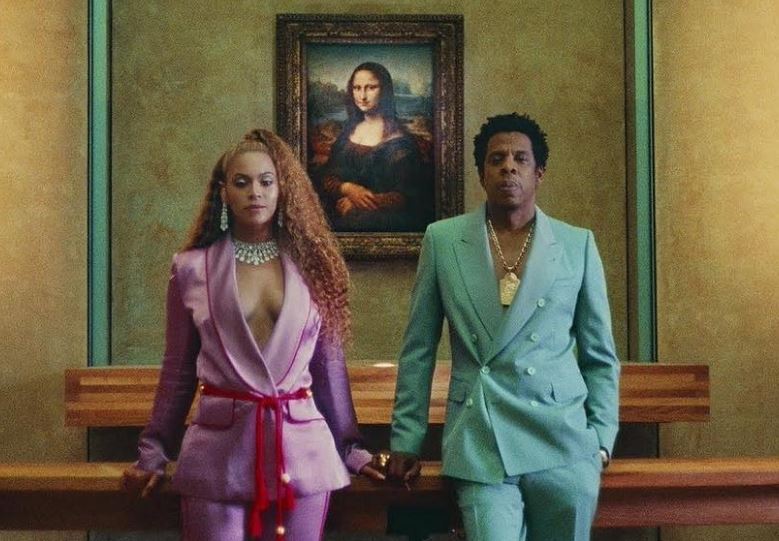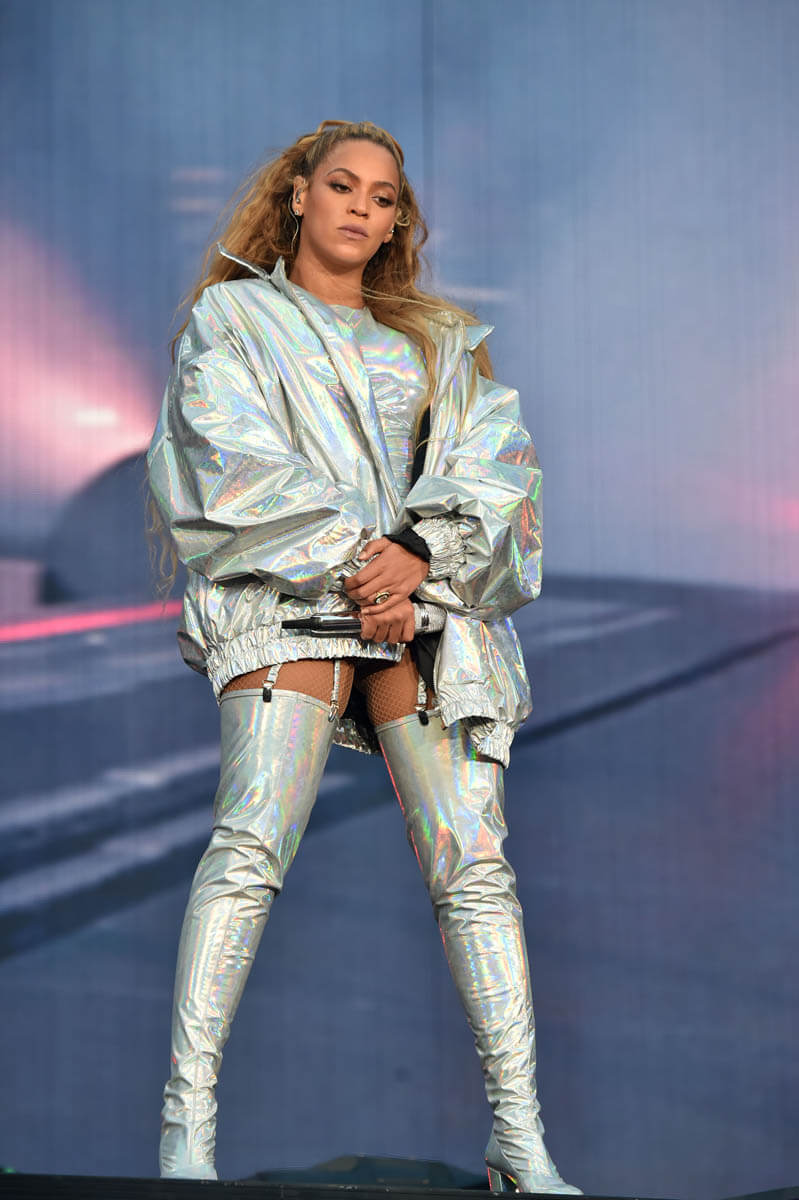The Carters: Everything is Love and legacy



The Carters have cemented their legacy. Beyoncé and Jay-Z are BEYONCĖ and JAY-Z, Queen and King of hip-hop, reigning rap royalty and culture provocateurs. Their pages in the music history books are already bookmarked. Even before Saturday, Beyoncé Giselle Knowles and Shawn Carter’s place among the legends of this generation was reserved.
They know this. They know that they are rich and powerful and black - three qualities that would not be in the same sentence in America not too long ago. But the Carters are international superstars and their reach surpasses the borders of their unforgiving (depending on your hue) home country. With Everything is Love, the Carters have made it clear that their quest is longevity. Their quest is world domination. Their quest is a family name and a legacy that will outlive them. In that quest, they are f-cking sh-t up. They are disrupting the very institutions that have proclaimed throughout history that people who look like them don’t belong. There are the physical institutions, like the Louvre, Coachella (now forever known as Beychella), the Grammys and the NFL, and there are the social ones, like marriage, parenthood, and wealth.
My great-great-grandchildren already rich
That's a lot of brown children on your Forbes list
I threw a sock across the room the first time I heard that line. COME ON.
That’s Beyoncé on “BOSS,” the third track off the album and one of the many references to the Carters’ life of affluence. It’s the most powerful of all the nods to riches because it says so much with so little. There was only one black person on Forbes’ billionaire list released in March and the majority of those who did make the list are—you guessed it— white men. They may not be billionaires (yet) but Beyoncé and Jay-Z have reached a level of prosperity that can be passed down through generations and they are going to make sure that happens. Remember, they’ve got a daughter who boldly stated that she’s “never seen a ceiling in her whole life,” a lyric Beyoncé reiterates on Nice. That’s a radical thing for a little black girl to believe. They’ve got a son who will forever be referred to as “Sir,” no matter what space he’s in. They’ve got three children who now get to watch their parents turn the Louvre, the world’s largest and most prestigious art museum, into their own personal backdrop whenever they want.
MOM AND DAD DID NOT COME TO PLAY.
Before I get into the video for Apesh-t, the one that should be projected on the walls of the Louvre until the end of time, let’s address the obvious. The biggest critique I’ve seen directed at Bey and Jay is that they’re just shallow people who flaunt their wealth too much and conform to a corrupt capitalist society. OK but what are they supposed to do, act like they’re not rich? Lainey has referenced a few times on Show Your Work the idea of the revolutionist vs the reformer. A reformer f-cks sh-t up from the inside while a revolutionist completely bypasses the system to incite change. In a lot of ways, Bey and Jay are reformers. They stir sh-t from the inside.
As Doreen St Felix wrote in her breakdown of Beychella, Beyoncé possesses “a recognition that excelling at her art requires overpowering the arenas that would have the power to diminish her.” There are few figures more powerful than Beyoncé, our one-named Queen, the greatest performer of all time. There are institutions that have held a lot of power over her though. There’s the looming power of white supremacy, especially now in the United States, but there’s also spaces like the Louvre, which are constant reminders of the historic diminishment and erasure of black bodies in works of art that still revered today. No matter how famous and rich you get, you’re still black.
I’m going to be real with you, I do not have an art history degree. After watching Apesh-t, I wish I did. My only contribution is that the Carters at the Louvre felt similar in message to Solange’s show at the Guggenheim. That’s as far back as my art museum knowledge goes. The good thing is that there are a lot of smart people out there with art history degrees who are explaining the layers and layers of symbolism and meaning behind the art featured in Apesh-t. Vulture has a good Art History for Dummies recap here. My favourite breakdown is this extensive thread by Heidi Herrera (there’s a link in her bio where you can support her work). She points out that most of the pieces are from the Neoclassical era or the time when Napolean was a little sh-t who colonized and conquered without abandon. Heidi’s main point is that the centering of black bodies and black love in a space like the Louvre is so profound because of its history.
I can’t believe we made it
Beyoncé singing “I can’t believe we made it” over and over while blackness takes over the Louvre is so beautiful I could cry. Here’s how Genius breaks down the lyric:
Beyoncé, whose mother is of French Creole origin, is highly aware that her existence is a direct result of slavery and French colonisation. Her current success and power in this world was undoubtedly paved by the suffering of her predecessors. The video highlights that the Carters are thankful for those ancestral sacrifices – for in a society built on the blood of their people, they were never expected to make it.
“They were never expected to make it.” On Summer, Jay looks back on his sleepless childhood nights in the Marcy projects and juxtaposes that with the image of his kids now “sound asleep” in Bel-Air. Even on Watch the Throne when Jay rapped, “if you escaped what I escaped, you’d be in Paris getting f-cked up too,” I don’t think he ever expected he’d make it to the Louvre. THE LOUVRE. I will never get over this.
Apesh-t serves as the visual accompaniment to just one song but the visuals feel like they fit with the whole album. The album is dripping with decadence and sophistication. It’s high art for your ears while also relying heavily on trap beats. It’s not a masterpiece like Lemonade or an introspective therapy session like 4:44. It’s a party. Sonically, it’s the album of the summer. Lyrically, it’s the final act.
Everything is Love completes the trilogy of works about Beyoncé and Jay-Z’s marriage. Their marriage is messy, it’s one marred with Jay’s infidelity and scandals that the album addresses head on but above anything else, Everything is Love is romantic and FUN. If Lemonade was a black feminist declaration and 4:44 was an admission of guilt or plea for forgiveness, Everything is Love is a celebration of a union finally at peace.
Beyoncé and Jay-Z want us to know that they are happy. There’s literally a song called LoveHappy where they repeat that they are “happy in love.” In it, they go back and forth about the details of their marital woes.
Bey: Yeah, you f-cked up the first stone, we had to get remarried.
Jay: Yo, chill man.
Bey: We keepin’ it real with these people, right? Lucky I ain’t kill you when I met that ---
Jay: Alright, alright.
There’s gossip here in that Beyoncé is alluding to the fact that she met “Becky” and Jay later channels Common to admit that they “broke up and got back together” but I care more about their lyrical sparring. This exchange is HILARIOUS and it highlights a theme on the album – it’s Beyoncé ’s show, Jay just showed up. Jay has his moments but he mostly fades into the background letting Beyoncé shine as she does, knowing his place. Seriously, Beyoncé ’s flow on Nice is SO NICE. Beyoncé may just be the best trap rapper of our generation. Sorry Migos. Also, if Bey and Jay still cared about singles, Friends would be on HEAVY radio play all summer.
There are some members of the Beyhive who, understandably, haven’t forgiven Jay for cheating on our Queen. They weren’t down with the joint tour or the joint album. I understand craving solo Beyoncé but the Carters have a brand to uphold and institutions to reform from the inside out. Their marriage is now intrinsically linked to their success. That should probably make me nervous given Jay’s past bullsh-t but it doesn’t. Especially since Beyoncé is not playing the role of the docile wife. Throughout the whole album, Bey reminds Jay that he’s not “married to no average b-tch, boy.” And Beyoncé and Jay-Z are using their marriage as a beacon of black love. I go back to this quote by Vulture’s Dee Lockett often:
“[Black] love is always political, it has no choice. When it fails, it’s a failure for all black lovers.”
The Atlantic put it like this:
Marriage may be a traditional institution, but the Carters present it almost as a weapon of revolution, allowing them to strike out against other institutions—first among them racism and its pernicious symptom, black poverty.
Why can’t the poster couple of music matrimony look like Beyoncé and Jay-Z? In reveling in their domestic bliss, they are creating a new image of black love, one that challenges the bullsh-t stereotypes we still see perpetuated today. That’s Jay and Bey being reformists in their own way.
As revolutionaries, they both take on white-run institutions like the Grammys, the Super Bowl and the NFL on Everything is Love. Beyoncé raps that she doesn’t give “two f-cks” about Spotify while Jay seemingly calls out Drake and Kanye on Boss for not supporting TIDAL, a black-run streaming service Jay founded to further cement the Carters’ legacy.
To them invoices, separate the men from the boys
Over here we measure success by how many people successful next to you
Here we say you broke if everybody gets broke except for you
That’s about creating sh-t that lasts longer than a Lambo. It’s more than bragging about wealth if it’s about leaving an enduring legacy and a culture that’s better off than when they found it. The Carters did all that on a Saturday afternoon in June. I can’t believe they made it.
